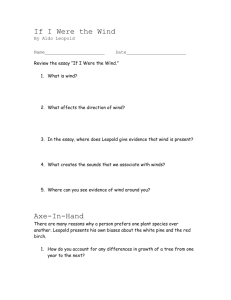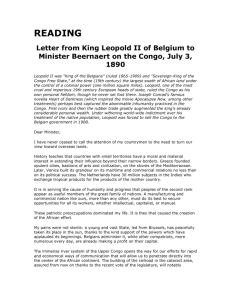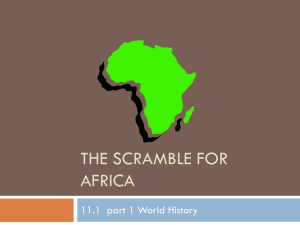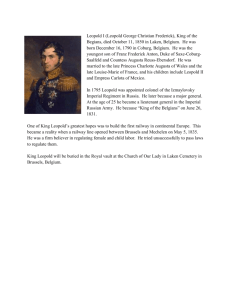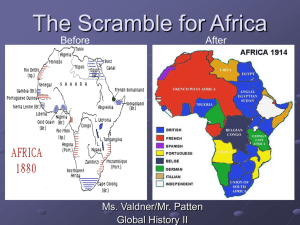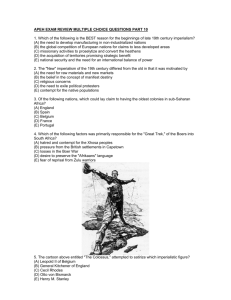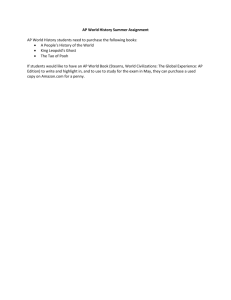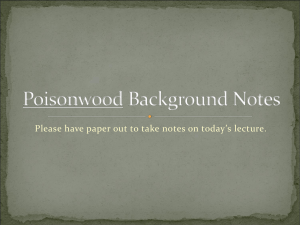leopoldpowerpoint
advertisement
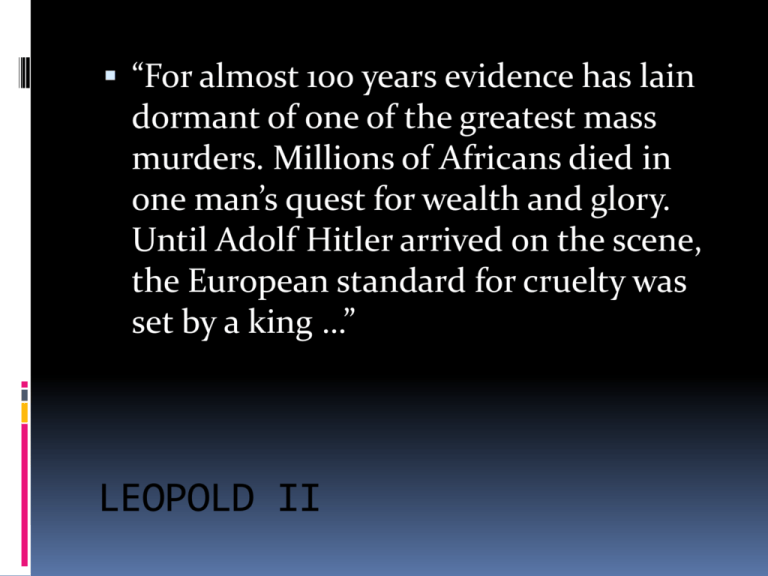
“For almost 100 years evidence has lain dormant of one of the greatest mass murders. Millions of Africans died in one man’s quest for wealth and glory. Until Adolf Hitler arrived on the scene, the European standard for cruelty was set by a king …” LEOPOLD II KING LEOPOLD II OF BELGIUM Birth Born April 9th 1835 in Brussels, the capital of Belgium. He is the eldest son of Léopold I, first king of the Belgians. His full name is Léopold Louis Philippe Marie Victor. At the age of 18, Léopold married the 17 year old Archduchess of Austria, Marie Henriette Anne von Habsburg-Lothringen on August 22 1853. The happy couple The couple was noted for fighting on their honeymoon, as Leopold would not ride with Marie in a gondola. Marie began crying, setting the tone for an uncomfortable 49 years of marriage. In search of a colony Leopold’s father had made over 50 attempts to get a colony, all to no avail. His son would be more successful. Leopold, disappointed with the small country of Belgium, believed that he needed colonies to increase his wealth and prestige. He began looking for colonies in Africa and Asia with little success. “My ambition is to make Belgium greater, stronger and more beautiful.” -Leopold II The elevation of Belgium was the elevation of Leopold himself Settling on the Congo At the start of Leopold’s reign, the Congo region was virtually unknown to Europeans. For Leopold it represented his last chance. The Congo was to be his new colony at any cost. Henry Morton Stanley • “Dr. Livingston, I presume?” •Born in Wales but pretended to be American • The first Westerner to cross from the Eastern to Western coasts of Africa •Leopold commissioned Stanley to explore the Congo River effectively opening up the Congo region for further exploration. Leopold began convincing Europe and America that his efforts in the Congo were completely charitable and of a Christian nature. International African Association and the Congo Association were established as charitable organizations The Congo Association was run exclusively for profit Keep them ignorant “Care must be taken not to let it be obvious that the Congo Association and the African Association are different, the public doesn’t grasp that.” – King Leopold II Bribes and trickery were used by Stanley’s men to coerce Congolese leaders to sign over land and resources to Leopold. Similar to how Manhattan Island was traded for beads by Native Americans. The “Congo Free State” is established Leopold instituted a local military known as the “Force Publique” to carry out orders. These police officers were local Congolese who reported to Belgian (and other European) superiors. Leopold installed forced labor camps for collecting valuable natural resources. Berlin Conference By 1884 the great powers were meeting in Berlin, ready to hand over the Congo to the King. No Africans were invited The Berlin Conference gave Leopold everything he wanted. He had promised free trade for Europeans into the Congo region. Rubber saves the investment Despite Leopold’s armed soldiers and forced labor camps, his investment in the Congo was not profitable (at first). With John Dunlop’s invention of the pneumatic tire the demand for rubber skyrocketed. The Congo had the world’s largest supply of rubber! Harsh conditions With European markets demanding rubber, Leopold told his officers to draw out as much as possible. A common practice was to capture a village and ransom women and children, forcing the men to venture into the forest to collect rubber. By 1900 the Congo Free State is the most lucrative colony in Africa Force Publique Uniform Missionaries Speak Out George Washington Williams publishes an Open Letter to the King in 1890 detailing atrocities William H. Sheppard Came to Congo as part of “back to Africa” movement Traveled extensively and learned of abuses through contact with locals – reported his findings in the US press The most well known practice of punishment at the time was the cutting off of a person’s right hand. Testimonial from Swedish Missionary “When I crossed the stream I saw some dead bodies hanging down from the branches in the water. As I turned my face away at the horrible sight one of the native corporals who was following us down said “Oh, that’s nothing, a few days ago I returned from a fight and brought the white men 160 hands and they were thrown into the river.”” Why the hands? Each militiaman was issued a fixed number of cartridges before a raid Pay was low so militiamen frequently used their rifles to hunt To prove he hadn’t wasted any cartridges, a militiaman would bring back a hand for each cartridge that he’d fired. 10 million deaths in the Congo There are no exact figures for the loss of life during Leopold’s reign Accounts of individual populations routinely show half of the adult males as missing In 1920 the population of the Congo was 10 million . Thus it is assumed that in 1880 the population had been twice that (20 million) In some districts the loss rose to 60-90% of the male population It all comes to an end… International pressure mounts Many articles are published outlining the horrors taking place in the Congo Author Mark Twain campaigns to end Leopold’s reign in Congo with King Leopold’s Soliloquy In 1908 Leopold is forced to turn control of the Congo over to the Belgian government – now to be called the Belgian Congo Leopold dies in 1909
